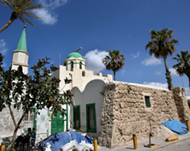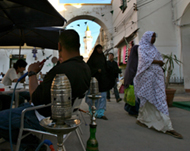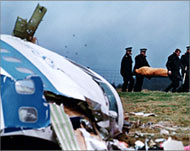Is Libya ready for US business?
With ties between the two countries steadily warming up, Americans are ready to do business in Libya again. But is Libya ready for them?

With just one luxury hotel, one Protestant church, a ban on alcohol, a population with limited English, and an entrenched bureaucracy left over from decades of socialism, Libya hardly seems appealing to Western businesses.
Yet American and European companies have been going on trade delegations for the past several years as the various sanctions against Libya have been lifted.
After Libyan leader Colonel Muammar al-Qadhafi fulfilled all requirements for the lifting of UN, British and US sanctions, Western – including American – companies saw a green light to do business in Libya again.
Not surprisingly, the biggest American companies re-entering Libya are from the energy sector. These include the Texas-based Marathon Oil Corp, Conoco Phillips, ExxonMobil Corp, and California-based Chevron Corp and Occidental Petroleum Corp.
 |
|
Libya’s infrastructure is old and |
Libyan lure
The most important natural resources in Libya are its oil and natural gas reserves. A 2005 estimate put Libya’s proven oil reserves at 39-40 billion barrels and its natural gas reserves at 52 trillion cubic feet, one tenth the reserves of Saudi Arabia – the world’s most oil-rich country.
“Libya is an important country with significant resource potential on a global scale,” said Paul Weeditz, Marathon spokesman.
Marathon left Libya in 1986 when US sanctions forced them to close their operations there. The company has been negotiating the terms of its re-entry for the past two years, and they are fully engaged as partners with Amerada Hess, Conoco Philips and the Libyan National Oil Company.
Weeditz says they expect to produce 40-45,000 barrels per day for the year 2006.
Libya is not just about the oil, however.
Heritage attractions
With an outdated infrastructure, a desert climate without agricultural self-sufficiency, and a number of ancient ruins, companies outside of the energy sector – that specialise in everything from construction to tourism – will all have a place in the newly open markets of Libya.
The United Nations’ Educational, Scientific and Cultural Organisation(UNESCO) lists five world heritage sites in Libya. They include the Roman port of Sabratha, the temples and forums of Leptis Magna, the 7th century BC Greek town of Cyrene and the Roman city of Ghadames.
 |
|
Improved relations with the |
Mary Dell Lucas, manager of Far Horizons Archaeological and Cultural Trips Inc didn’t hesitate to organise a tour to a country full of ancient ruins that had been off-limits to Westerners for 20 years.
Lucas says that when their September tour in Libya was first announced in January, ten of the 17 places filled up in the first week, and the remaining places were filled in late May. The company is now planning a second trip in March to meet the high demand.
Construction boom
With tourists and oil tycoons exploring Libya, construction will be a major part of Libya’s newly open market. Bechtel Co, a San Francisco-based engineering and construction company, with operations in some 40 countries, including Iraq, is now eyeing Libya as a place to do business.
“Bechtel always looks for new opportunities in its major business lines,” said Bechtel spokesman Jonathan Marsha. He added, “We began looking at possible jobs in Libya after the US embargo was lifted in 2004. Sectors of interest to us – as builders, not investors – include oil and gas, fossil power, telecommunications, and civil infrastructure”.
Even mobile phones, which most Libyans have done without during the sanctions, are now in high demand.
Motorola spokesman Norman Sandler says American mobile phone companies expect to be operating in Libya by next year.
Long road
But it could take decades for Libya to recover from a string of major sanctions and its international isolation.
“Lifting sanctions is important, but not sufficient. People need to see a good investment climate, and feel like they’ll get a good return,” said a spokesman from USA Engage, a Washington-based organisation representing US businesses that is against unilateral sanctions.
Even with tour companies looking to take advantage of the country’s rich archaeological history, Libya does not appear ready for them.
“There are few good restaurants, and even fewer good hotels. And the hotels that are older than 20 years have not been maintained. They were nationalised and were allowed to decay,” Lucas of Far Horizons told Aljazeera.net.
“So the so-called 4- and 5-star hotels are in reality more like shabby 2- and 3-star,” said Lucas. She added, “The carpets are dirty, the toilet seats are broken, the bathtubs stained.”
As for supplier companies, “Overcoming regulatory issues that remain outstanding” is one of the biggest challenges, said Sandler. “The re-establishment of diplomatic ties doesn’t mean there’s an easy flow of trade. There’s a lot that still needs to happen.”
Breaking the isolation
Libya’s isolation from the West began after al-Qadhafi seized control of the country in a military coup in 1969 and developed relations with the Soviet Union as a primary arms supplier.
In 1984, the United Kingdom cut off all diplomatic relations with Libya following the murder of a British policewoman outside Libya’s embassy in London. In 1986, the United States – Libya’s largest single customer for crude oil – bombed the country after Libya was implicated in the bombing of a West Berlin disco frequented by US military personnel.
 |
|
UN sanctions were imposed over |
The UN imposed sanctions against Libya in 1992-93 after it was implicated in the bombing of Pan Am flight 103 over Lockerbie, Scotland in 1988 and the bombing of a French flight over Niger in 1989.
It wasn’t until 1999, when al-Qadhafi delivered the Lockerbie bombing suspects from Libya to The Hague that tensions between the long-isolated North African country and the West slowly began to ease.
In 2003, al-Qadhafi fulfilled requirements that would remove UN sanctions including providing compensation to families of the victims who died in the Pan Am flight in Lockerbie. In December 2003, al-Qadhafi announced that he would no longer pursue nuclear weapons. By September 2004, the United States had lifted all economic and travel sanctions against Libya.
“Al-Qadhafi’s diplomacy was a pleasant surprise – even to many people in Washington who follow (Middle East politics) closely,” Gary Hufbauer a senior fellow at the International Institute of Economics in Washington, told Aljazeera.net.
Love for Americans
“I don’t expect to see any recognisable democracy emerge in Libya – even after al-Qadhafi dies,” predicts Hufbauer. “I do think Libya will continue in its autocratic ways while no longer being antagonistic towards the West. Al-Qadhafi could become no more autocratic than the King of Morocco, whom we like a lot.”
The Libyan political and economic climate might be less than ideal for Westerners for years to come. But the hospitality of the locals might end up being the biggest appeal for American expatriates wanting to set up businesses there.
“Libyans love Americans, and that surprised me,” said Jeff Hallinger, public relations director of the Phoenicia Group, that has been in Tripoli for four years.
“The media portrays Libya as anti-American and radical. But the people here love American pop culture, and a lot of them are learning English.”
Hallinger added, “If you tell a Libyan you’re American, he’ll immediately invite you to dinner.”